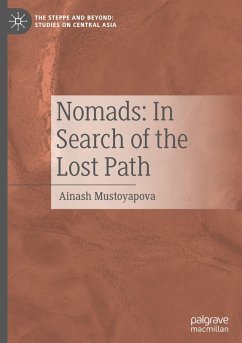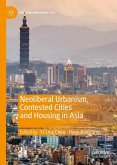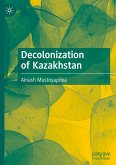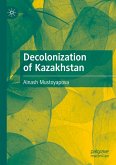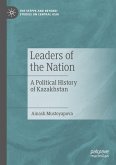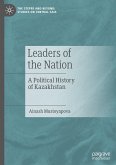Ainash Mustoyapova
Nomads: In Search of the Lost Path
Ainash Mustoyapova
Nomads: In Search of the Lost Path
- Gebundenes Buch
- Merkliste
- Auf die Merkliste
- Bewerten Bewerten
- Teilen
- Produkt teilen
- Produkterinnerung
- Produkterinnerung
The book is devoted to the problem of the civilizational development of the Kazakhs, as descendants of nomads, at the present stage. The author pays special attention to how the eras of modernity and postmodernity influenced today's Kazakhstan. In this anti-colonial polemic, the author argues in favor of finding the origin of Kazakh nomad culture prior to the colonization of Kazakhstan by imperial Russia; in exploring nomad histories, she seeks to find an alternative path. The book may be of interest to researchers studying the history, politics, sociology, culture of Central Asia and, more broadly, issues of the development of modern civilization.…mehr
Andere Kunden interessierten sich auch für
![The Invention of Tradition in China The Invention of Tradition in China]() Suvi RautioThe Invention of Tradition in China100,99 €
Suvi RautioThe Invention of Tradition in China100,99 €![The Invention of Tradition in China The Invention of Tradition in China]() Suvi RautioThe Invention of Tradition in China97,99 €
Suvi RautioThe Invention of Tradition in China97,99 €![Neoliberal Urbanism, Contested Cities and Housing in Asia Neoliberal Urbanism, Contested Cities and Housing in Asia]() Neoliberal Urbanism, Contested Cities and Housing in Asia68,99 €
Neoliberal Urbanism, Contested Cities and Housing in Asia68,99 €![Decolonization of Kazakhstan Decolonization of Kazakhstan]() Ainash MustoyapovaDecolonization of Kazakhstan98,99 €
Ainash MustoyapovaDecolonization of Kazakhstan98,99 €![Decolonization of Kazakhstan Decolonization of Kazakhstan]() Ainash MustoyapovaDecolonization of Kazakhstan98,99 €
Ainash MustoyapovaDecolonization of Kazakhstan98,99 €![Leaders of the Nation Leaders of the Nation]() Ainash MustoyapovaLeaders of the Nation106,99 €
Ainash MustoyapovaLeaders of the Nation106,99 €![Leaders of the Nation Leaders of the Nation]() Ainash MustoyapovaLeaders of the Nation106,99 €
Ainash MustoyapovaLeaders of the Nation106,99 €-
-
-
The book is devoted to the problem of the civilizational development of the Kazakhs, as descendants of nomads, at the present stage. The author pays special attention to how the eras of modernity and postmodernity influenced today's Kazakhstan. In this anti-colonial polemic, the author argues in favor of finding the origin of Kazakh nomad culture prior to the colonization of Kazakhstan by imperial Russia; in exploring nomad histories, she seeks to find an alternative path. The book may be of interest to researchers studying the history, politics, sociology, culture of Central Asia and, more broadly, issues of the development of modern civilization.
Produktdetails
- Produktdetails
- The Steppe and Beyond: Studies on Central Asia
- Verlag: Palgrave Macmillan / Springer Nature Singapore / Springer, Berlin
- Artikelnr. des Verlages: 89559650, 978-981-95-1879-1
- Seitenzahl: 340
- Erscheinungstermin: 2. Oktober 2025
- Englisch
- Abmessung: 216mm x 153mm x 23mm
- Gewicht: 551g
- ISBN-13: 9789819518791
- ISBN-10: 9819518792
- Artikelnr.: 75025751
- Herstellerkennzeichnung
- Springer-Verlag GmbH
- Tiergartenstr. 17
- 69121 Heidelberg
- ProductSafety@springernature.com
- The Steppe and Beyond: Studies on Central Asia
- Verlag: Palgrave Macmillan / Springer Nature Singapore / Springer, Berlin
- Artikelnr. des Verlages: 89559650, 978-981-95-1879-1
- Seitenzahl: 340
- Erscheinungstermin: 2. Oktober 2025
- Englisch
- Abmessung: 216mm x 153mm x 23mm
- Gewicht: 551g
- ISBN-13: 9789819518791
- ISBN-10: 9819518792
- Artikelnr.: 75025751
- Herstellerkennzeichnung
- Springer-Verlag GmbH
- Tiergartenstr. 17
- 69121 Heidelberg
- ProductSafety@springernature.com
Ainash Mustoyapova – Candidate of Philological Sciences, Associate Professor, is the author of more than 70 scientific and educational publications, and more than 150 journalistic articles. Major works include: The Japanese Novel of the second half of the twentieth century (2022), The Modernist Novel (2022, 2024), Famine of 1931–1933 in Central Kazakhstan: collection of archival documents and memoirs (2023), Decolonization of Kazakhstan (2023), Leaders of the Nation: A Political History of Kazakhstan (2024).
Chapter 1. Preface. Looking back in time: Chapter 2. Nomadic civilization: 2.1 In search of lost meanings: 2.2 Nomads and Civilizational Challenge: Another Projection: 2.3 One's own culture and another's way: 2.4 Nomads and sedentary: a long rapprochement: 2.5 Nation: construct vs natural process: 2.6 Imposed feudalism and inculcated neo-feudalism: 2.7 Nomads and the State: 2.8 The Revolution and the Kazakhs.- Chapter 3. Modernity and Nomads: 3.1 The Age of Modernity and the "modernization" of nomads: 3.2 Catch up with modernization: 3.3 Concluding the Modern Era: 3.4 Western Democracy and Nomadic Democracy: the Introduced and the Historically Contingent: 3.5 Under the guise of liberalism: 3.6 From pseudo-paternalism to populism: 3.7 Other People's "Diseases" or Bureaucracy at the Service of the State: 3.8 System of power and freedom.- Chapter 4. Nomads and the Information Age: 4.1 Reconstruction, or Return to Self: 4.2 The key to success, or Space and Time: 4.3 Mentality to help: 4.4 Armed with benefits: 4.5 The Phenomenon of Nomadism, or Ideas Rule the World: 4.6 Mental Burnout vs Return of Meanings: 4.7 Spiral, or Counterfactual History: 4.8 Returning to History.- Chapter 5. Nomads in the postmodern era: 5.1. Kazakhstan in the postmodern period: 5.2 Postmodernism: Crisis of Ideologies and Authorities: 5.3 Kazakhstan: Power and Society in the Postmodern Era: 5.4 Education and knowledge in the postmodern era: 5.5 We Capitulated, or Information in the Postmodern Era: 5.6 Globalization and Nomadism in the Postmodern Era: Kazakhstan: 5.7 The space and future of the country: 5.8 Consumer society and credit bondage: Chapter 6. Nomads and the New Era: 6.1 Between modernity and postmodernity: 6.2 Entering a new era: metamodernity: 6.3 Metamodern, or the Age of Movement, Communication and Consensus: 6.4 Instead of the end of history and instead of the clash of civilizations: 6.5 Reclaiming a lost identity: 6.6 Identity for salvation: 6.7 Elite and pseudo-elite: 6.8 Threats to post-democracy.- Chapter 7. Conclusion. The Turn of History.
Chapter 1. Preface. Looking back in time: Chapter 2. Nomadic civilization: 2.1 In search of lost meanings: 2.2 Nomads and Civilizational Challenge: Another Projection: 2.3 One's own culture and another's way: 2.4 Nomads and sedentary: a long rapprochement: 2.5 Nation: construct vs natural process: 2.6 Imposed feudalism and inculcated neo-feudalism: 2.7 Nomads and the State: 2.8 The Revolution and the Kazakhs.- Chapter 3. Modernity and Nomads: 3.1 The Age of Modernity and the "modernization" of nomads: 3.2 Catch up with modernization: 3.3 Concluding the Modern Era: 3.4 Western Democracy and Nomadic Democracy: the Introduced and the Historically Contingent: 3.5 Under the guise of liberalism: 3.6 From pseudo-paternalism to populism: 3.7 Other People's "Diseases" or Bureaucracy at the Service of the State: 3.8 System of power and freedom.- Chapter 4. Nomads and the Information Age: 4.1 Reconstruction, or Return to Self: 4.2 The key to success, or Space and Time: 4.3 Mentality to help: 4.4 Armed with benefits: 4.5 The Phenomenon of Nomadism, or Ideas Rule the World: 4.6 Mental Burnout vs Return of Meanings: 4.7 Spiral, or Counterfactual History: 4.8 Returning to History.- Chapter 5. Nomads in the postmodern era: 5.1. Kazakhstan in the postmodern period: 5.2 Postmodernism: Crisis of Ideologies and Authorities: 5.3 Kazakhstan: Power and Society in the Postmodern Era: 5.4 Education and knowledge in the postmodern era: 5.5 We Capitulated, or Information in the Postmodern Era: 5.6 Globalization and Nomadism in the Postmodern Era: Kazakhstan: 5.7 The space and future of the country: 5.8 Consumer society and credit bondage: Chapter 6. Nomads and the New Era: 6.1 Between modernity and postmodernity: 6.2 Entering a new era: metamodernity: 6.3 Metamodern, or the Age of Movement, Communication and Consensus: 6.4 Instead of the end of history and instead of the clash of civilizations: 6.5 Reclaiming a lost identity: 6.6 Identity for salvation: 6.7 Elite and pseudo-elite: 6.8 Threats to post-democracy.- Chapter 7. Conclusion. The Turn of History.

